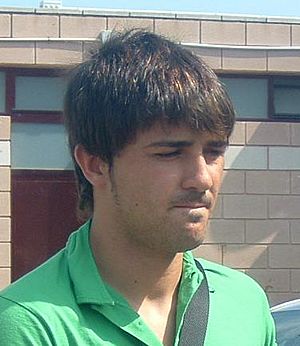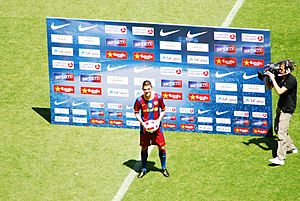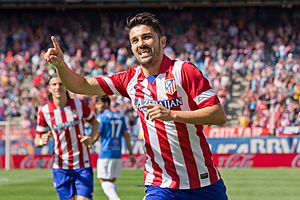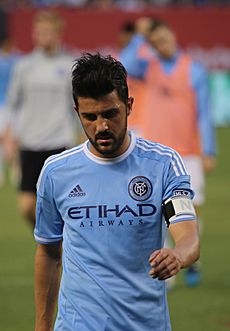David Villa facts for kids
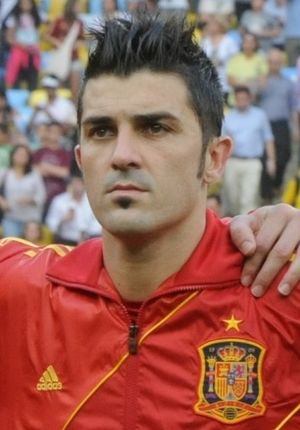
Villa with Spain at the 2013 FIFA Confederations Cup
|
|||||||||||||||||||||||||||||||
| Personal information | |||||||||||||||||||||||||||||||
|---|---|---|---|---|---|---|---|---|---|---|---|---|---|---|---|---|---|---|---|---|---|---|---|---|---|---|---|---|---|---|---|
| Full name | David Villa Sánchez | ||||||||||||||||||||||||||||||
| Date of birth | 3 December 1981 | ||||||||||||||||||||||||||||||
| Place of birth | Langreo, Spain | ||||||||||||||||||||||||||||||
| Height | 1.75 m (5 ft 9 in) | ||||||||||||||||||||||||||||||
| Position(s) | Striker | ||||||||||||||||||||||||||||||
| Youth career | |||||||||||||||||||||||||||||||
| 1991–1999 | Langreo | ||||||||||||||||||||||||||||||
| 1999–2000 | Sporting Gijón | ||||||||||||||||||||||||||||||
| Senior career* | |||||||||||||||||||||||||||||||
| Years | Team | Apps | (Gls) | ||||||||||||||||||||||||||||
| 2000–2001 | Sporting Gijón B | 36 | (14) | ||||||||||||||||||||||||||||
| 2001–2003 | Sporting Gijón | 80 | (38) | ||||||||||||||||||||||||||||
| 2003–2005 | Real Zaragoza | 73 | (32) | ||||||||||||||||||||||||||||
| 2005–2010 | Valencia | 166 | (108) | ||||||||||||||||||||||||||||
| 2010–2013 | Barcelona | 77 | (33) | ||||||||||||||||||||||||||||
| 2013–2014 | Atlético Madrid | 36 | (13) | ||||||||||||||||||||||||||||
| 2014–2018 | New York City FC | 117 | (77) | ||||||||||||||||||||||||||||
| 2014 | → Melbourne City (loan) | 4 | (2) | ||||||||||||||||||||||||||||
| 2019–2020 | Vissel Kobe | 28 | (13) | ||||||||||||||||||||||||||||
| Total | 617 | (330) | |||||||||||||||||||||||||||||
| International career | |||||||||||||||||||||||||||||||
| 2001–2002 | Asturias | 2 | (1) | ||||||||||||||||||||||||||||
| 2002–2003 | Spain U21 | 7 | (0) | ||||||||||||||||||||||||||||
| 2005–2017 | Spain | 98 | (59) | ||||||||||||||||||||||||||||
|
Medal record
|
|||||||||||||||||||||||||||||||
| *Club domestic league appearances and goals | |||||||||||||||||||||||||||||||
David Villa Sánchez, born on December 3, 1981, is a Spanish former professional footballer. He played as a striker and is known as one of the best forwards of his time. Villa is the all-time top goalscorer for the Spain national team. He is currently the vice-president of Spanish club CF Benidorm.
He was nicknamed El Guaje (meaning The Kid in Asturian) because he often played football with older children. Villa overcame a serious leg injury as a child to start his professional career with Sporting de Gijón in 2001. After two seasons, he moved to Real Zaragoza, where he made his debut in La Liga, Spain's top football league. With Zaragoza, he won the Copa del Rey and Supercopa de España.
In 2005, Villa joined Valencia and won another Copa del Rey title. After five successful seasons at Valencia, he moved to Barcelona in 2010. In his first year there, he won his first La Liga title and the UEFA Champions League, even scoring in the 2011 final. He then played for Atlético Madrid, winning another La Liga title and reaching the 2014 UEFA Champions League final.
After his time in Spain, Villa joined the new MLS team New York City FC in 2014. He became the club's top goalscorer and appearance maker, winning the MLS MVP Award in 2016. In 2018, Villa moved to Vissel Kobe in Japan before retiring from playing in 2020.
Villa first played for Spain in 2005. He was a key player in the Spanish teams that won UEFA Euro 2008 and the 2010 FIFA World Cup. He was the top scorer at Euro 2008 and won the Silver Boot at the 2010 World Cup. He became Spain's top scorer in World Cup history with nine goals. Villa was the first Spanish player to score 50 international goals, and he retired from the national team with 59 goals in 98 matches.
Early Life and Football Start
Villa was born in Tuilla, a small town in Langreo, Asturias, in northern Spain. His father, José Manuel Villa, was a miner. When David was four years old, he broke his right leg. This injury could have stopped his football dreams, but he fully recovered. Because of the injury, he and his father worked hard to strengthen his left leg, which helped him become good with both feet.
Villa remembered his father's support, saying, "He would be there throwing me the ball over and over, making me kick it with my left leg when my right was in plaster after breaking it, I was four." He added that his dad was always there for him on the football field.
At 14, Villa almost quit football because he was unhappy with his coach. However, his parents encouraged him to keep going. He realized his talent could help him make a living. He started his football career at UP Langreo and joined the Mareo football school when he was 17.
Club Career Highlights
Sporting Gijón Beginnings
Many teams in Asturias were interested in Villa, but Real Oviedo thought he was too short. He got his professional start at his local club, Sporting de Gijón, following his childhood hero Quini. He played in the youth teams before making his first-team debut in the 2000–01 season. After scoring 25 goals in two seasons, he became a regular player.
Real Zaragoza Success
After scoring nearly 40 goals for Sporting, Villa moved to Spain's top league. Real Zaragoza signed him for about €3 million in the summer of 2003. He quickly adapted, scoring 17 goals in his first season. His first league goal came in a 3–0 win against Real Murcia. In April 2004, he scored all four of Zaragoza's goals in a 4–4 draw against Sevilla.
Zaragoza reached the 2004 Copa del Rey final. Villa scored a key goal against Real Madrid, helping his team win 3–2. Soon after, he was called up to play for the Spanish national team. Zaragoza fans were so proud that they created a chant: "illa illa illa, Villa maravilla" (Villa the marvel).
In the 2004–05 UEFA Cup, Villa played in a European competition for the first time. He scored two goals in a 2–0 win against Utrecht.
Valencia Years
In 2005, Villa joined Valencia for €12 million. In his first game for Valencia, an Intertoto Cup match, he scored in a 2–0 win. He scored against his old team, Zaragoza, in a 2–2 draw.
On September 21, Villa scored two goals against Barcelona at Camp Nou, helping Valencia earn a point. He also scored the winning goal against Real Madrid in October. In April 2006, Villa scored his first hat-trick for Valencia against Athletic Bilbao in just over five minutes, making it one of the fastest hat-tricks ever. Valencia won that game 3–0. He finished the season with 25 goals in 35 league matches, just one goal behind the league's top scorer. This was the best goal tally for a Valencia player in over 60 years.
Villa continued his great form in the 2006–07 season, playing alongside Fernando Morientes. They scored 43 goals together. Villa also played in the UEFA Champions League for the first time, scoring important goals against Roma and Shakhtar Donetsk. In October 2006, he was nominated for the Ballon d'Or award.
The 2007–08 season was challenging for Valencia, but Villa scored 18 goals in 26 games. He won his first trophy with Valencia, the Copa del Rey, beating Barcelona in the semi-finals and Getafe in the final. He signed a new contract with Valencia until 2014.
After being the top scorer at Euro 2008, Villa continued to shine in the 2008–09 season. In October 2008, Kaká called Villa "the best Spanish footballer." In December 2008, Villa ranked seventh in the 2008 Ballon d'Or awards. He finished the season as the third top scorer in La Liga with 28 goals, his best goal-scoring season at Valencia.
In 2009, Villa scored more goals than any other footballer, with 43 goals in 54 games for both Spain and Valencia. He was listed fourth in the "World's Top Goal Scorer 2009" rankings. In January 2010, he scored his 100th league goal with Valencia. On March 18, he scored a hat-trick against Werder Bremen in the Europa League, helping Valencia advance.
Barcelona Glory
On May 19, 2010, Barcelona agreed to sign Villa for €40 million. He signed a four-year contract. On May 21, over 35,000 Barcelona fans came to Camp Nou to see him presented. He was given his favorite number 7 jersey.
He made his first appearance for Barcelona in the 2010 Supercopa de España, helping them win their first trophy with him. His first goal for the club came in a friendly match against Milan. On August 29, 2010, Villa scored in his La Liga debut for Barcelona, helping them win 3–0. He also scored in his Champions League debut.
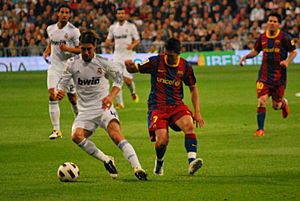
On November 29, 2010, Villa scored two goals in his first El Clásico match against Real Madrid, as Barcelona won 5–0. He said it was a "very important win." On May 28, 2011, Villa scored a fantastic goal from 25 yards out in Barcelona's 3–1 victory over Manchester United in the Champions League final.
In the 2011–12 season, Villa started strong, scoring in pre-season games. However, his season ended early when he broke his tibia (a bone in his lower leg) during a Club World Cup match in December 2011. This injury meant he missed the rest of the season and Euro 2012.
After eight months, Villa returned from his injury in August 2012. He scored in his first competitive match back, helping Barcelona win 5–1. In November, he scored his 300th career goal. In the Champions League, Villa scored a crucial goal against A.C. Milan to help Barcelona advance. He ended the season with 16 goals in 39 appearances, even though he often came on as a substitute while recovering from his injury.
Atlético Madrid Title
On July 8, 2013, Villa moved to Atlético Madrid. He scored in his debut for Atlético against his former club Barcelona in the 2013 Supercopa de España. He scored 13 league goals in his only season with Atlético, helping them win their first league title since 1996. He also helped them reach the Champions League final, where they lost to Real Madrid.
New York City FC Adventure
On June 1, 2014, Villa announced he was leaving Atlético to join a new team. The next day, he was revealed as the first player for the new New York City team in Major League Soccer (MLS), which would start playing in 2015. He was given the number 7 shirt.
To stay fit before the MLS season, Villa joined Melbourne City in Australia on a short loan. He scored on his debut against Sydney FC. He played four matches for Melbourne City before returning to New York.
Villa became New York City's first team captain in February 2015. He scored the team's first ever goal in a friendly match. On March 8, he played in their first MLS game, setting up a goal. A week later, he scored in their first home win. He scored 18 goals in the 2015 MLS season, but New York City did not make the playoffs.
In July 2016, Villa was chosen for the 2016 MLS All-Star Game. He won the MLS MVP Award for the best player in the league, scoring 23 goals in the 2016 Major League Soccer season. In August 2017, Villa scored his first MLS hat-trick. He finished the regular season with 22 goals. On April 29, 2018, Villa scored his 400th and 401st career goals for club and country.
Vissel Kobe and Retirement
On December 1, 2018, Villa signed with J1 League club Vissel Kobe in Japan, joining his former Barcelona teammate Andrés Iniesta. He scored his first J1 League goal on March 2. On November 13, 2019, Villa announced he would retire at the end of the season. He scored his final career goal from a penalty on December 7. On January 1, 2020, he played in the 2019 Emperor's Cup Final, which Vissel Kobe won, giving him a trophy before his retirement. Villa scored 13 goals in 28 J1 League matches.
Life After Playing
After retiring, David Villa became an owner of USL Championship side Queensboro FC in New York City.
In May 2021, Indian Super League club Odisha FC announced Villa as the head of Global Football Operations. His role includes advising coaches and helping young players. Villa said he would bring his experience to the club.
On March 28, 2023, David Villa's DV7 Group bought CF Benidorm, a Spanish football club. He was announced as the vice-president. The team was later promoted to the 2024–25 Tercera Federación season.
International Career for Spain
2006 World Cup Debut
Villa made his international debut for Spain on February 9, 2005, in a World Cup qualifier. His first international goal was a late equalizer against Slovakia.
He was chosen for Spain's squad at the 2006 FIFA World Cup. In his World Cup debut, he scored two goals in a 4–0 win against Ukraine. He also scored against France in the Round of 16. He and Fernando Torres were Spain's top scorers with three goals each.
Euro 2008 Victory
By late 2006, Villa became a key player for Spain. He scored six goals in Spain's qualification for Euro 2008. In the tournament, he formed a strong partnership with Torres. He scored a hat-trick in Spain's 4–1 win over Russia, becoming the first player to do so at a European Championship since 2000. He also scored a late winner against Sweden.
Villa missed the final due to a thigh injury, but Spain won the tournament, beating Germany 1–0. Despite missing the final, Villa's four goals were enough for him to be the top scorer and win the Golden Boot. He was also named in the UEFA Euro 2008 Team of the Tournament.
2009 Confederations Cup and Records
Villa continued his scoring form in qualification for the 2010 World Cup. He scored four goals in Spain's first three games. In 2008, he scored 12 goals for Spain, breaking Raúl's record of 10 goals in a calendar year. In 2009, he became the first Spanish international to score in six consecutive games.
In June 2009, Villa was part of Spain's squad for the 2009 FIFA Confederations Cup. He scored his second international hat-trick against Azerbaijan. He scored three goals in the tournament, helping Spain finish third and earning him the Bronze Shoe.
2010 World Cup Triumph
In 2010, Villa was the top international goalscorer in the world. He was selected for Spain's squad for the 2010 FIFA World Cup. In Spain's first World Cup match, they lost to Switzerland. Five days later, Villa scored both goals in a 2–0 win against Honduras.
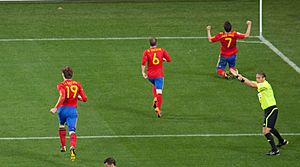
Villa helped Spain reach the Round of 16 by scoring the first goal in a 2–1 win over Chile. This goal made him Spain's all-time top scorer at the World Cup finals with six goals. In the Round of 16, Villa scored the only goal against Portugal, sending Spain to the quarter-finals. He scored again against Paraguay, with Spain winning 1–0. Spain then beat Germany 1–0 in the semi-finals.
Villa started in the final against the Netherlands. Spain won the championship 1–0 with a goal from Andrés Iniesta. Villa scored five of Spain's eight goals in the World Cup and was awarded the Silver Shoe. He was also named in the FIFA World Cup All-Star Team.
Euro 2012 Qualifiers and Injury
In UEFA Euro 2012 qualifying, Villa scored two goals against the Czech Republic in March 2011, making Spain win 2–1. This also meant he surpassed Raúl as Spain's all-time leading goalscorer. He scored his 50th international goal against Scotland in a 3–1 victory, where he also wore the captain's armband for the first time.
Villa was the top scorer in his qualifying group with seven goals. However, after breaking his tibia in December 2011, he missed Euro 2012. He said he was not 100% fit to play.
2013 Confederations Cup and 2014 World Cup
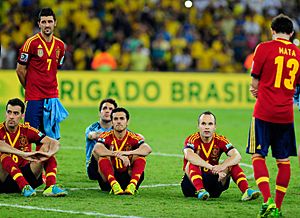
After recovering from his injury, Villa returned to the Spain team in 2013. He scored three goals against Tahiti in a 10–0 victory at the 2013 Confederations Cup.
Villa was part of Spain's squad for the 2014 FIFA World Cup. He had announced that he would retire from international football after the tournament. In his final international appearance, he scored his 59th goal for Spain and ninth in World Cup finals, in a 3–0 win against Australia on June 23, 2014.
In August 2017, Villa was called up to Spain's squad for 2018 World Cup qualification matches, three years after his retirement. His final appearance for Spain was against Italy.
Succeeding Raúl as Spain's Number 7
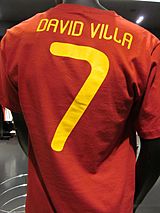
The Spanish media often compared Villa to Raúl, especially when Villa started wearing the number 7 jersey, which Raúl used to wear. Villa clarified that he earned his spot by playing well and that he had a good relationship with Raúl. He said he was proud to wear the Spain badge and score goals for his country. On March 25, 2011, Villa surpassed Raúl to become Spain's all-time top scorer.
Playing Style
David Villa is known as a great goalscorer and one of the best forwards of his time. He is naturally right-footed but can shoot powerfully with both feet because he trained his left leg after an injury. He was also good at taking free kicks and penalty kicks.
Villa was a fast, agile, and mobile player with excellent technique and dribbling skills. He was known for his hard work and smart movements on the field, creating space for his teammates. He also had good vision and passing ability, which allowed him to play in different roles, like a supporting forward or a winger, not just a centre-forward.
Personal Life
In 2003, Villa married his childhood sweetheart, Patricia González. They have three children. The names of his children are engraved on his football boots. His football idols are fellow Asturians Luis Enrique and Quini, who also played for Sporting Gijón and Barcelona.
Villa often takes part in charity events, especially with UNICEF. Every year since 2008, a David Villa Camp is held, where children receive training from professional footballers.
Villa has appeared in the FIFA video game series. He was on the cover of the Spanish edition of FIFA 07 and the MLS custom edition of FIFA 16. In 2010, Villa sang on a song called "Insurrection" to help raise money for an art and education school in Mali.
Business Ventures
David Villa owns DV7 Group, which includes DV7 Soccer and DV7 Management. DV7 Soccer started in 2016 and runs football academies around the world in countries like the United States, Puerto Rico, Spain, Japan, and the Dominican Republic.
Career Statistics
Club
| Club | Season | League | Cup | Continental | Total | |||||
|---|---|---|---|---|---|---|---|---|---|---|
| Division | Apps | Goals | Apps | Goals | Apps | Goals | Apps | Goals | ||
| Sporting Gijón B | 2000–01 | Segunda División B | 35 | 13 | — | — | 35 | 13 | ||
| 2001–02 | Segunda División B | 1 | 1 | — | — | 1 | 1 | |||
| Total | 36 | 14 | — | — | 36 | 14 | ||||
| Sporting Gijón | 2000–01 | Segunda División | 1 | 0 | — | — | 1 | 0 | ||
| 2001–02 | Segunda División | 40 | 18 | 4 | 2 | — | 44 | 20 | ||
| 2002–03 | Segunda División | 39 | 20 | 1 | 1 | — | 40 | 21 | ||
| Total | 80 | 38 | 5 | 3 | — | 85 | 41 | |||
| Zaragoza | 2003–04 | La Liga | 38 | 17 | 8 | 4 | — | 46 | 21 | |
| 2004–05 | La Liga | 35 | 15 | 3 | 0 | 10 | 3 | 48 | 18 | |
| Total | 73 | 32 | 11 | 4 | 10 | 3 | 94 | 39 | ||
| Valencia | 2005–06 | La Liga | 37 | 25 | 4 | 2 | 6 | 1 | 47 | 28 |
| 2006–07 | La Liga | 36 | 16 | 2 | 0 | 11 | 5 | 49 | 21 | |
| 2007–08 | La Liga | 28 | 18 | 6 | 3 | 7 | 3 | 41 | 24 | |
| 2008–09 | La Liga | 33 | 28 | 5 | 2 | 5 | 1 | 43 | 31 | |
| 2009–10 | La Liga | 32 | 21 | 2 | 0 | 11 | 7 | 45 | 28 | |
| Total | 166 | 108 | 19 | 5 | 40 | 17 | 225 | 130 | ||
| Barcelona | 2010–11 | La Liga | 34 | 18 | 6 | 1 | 12 | 4 | 52 | 23 |
| 2011–12 | La Liga | 15 | 5 | 3 | 1 | 6 | 3 | 24 | 9 | |
| 2012–13 | La Liga | 28 | 10 | 5 | 5 | 10 | 1 | 43 | 16 | |
| Total | 77 | 33 | 14 | 7 | 28 | 8 | 119 | 48 | ||
| Atlético Madrid | 2013–14 | La Liga | 36 | 13 | 4 | 2 | 7 | 0 | 47 | 15 |
| Melbourne City (loan) | 2014–15 | A-League | 4 | 2 | 0 | 0 | — | 4 | 2 | |
| New York City FC | 2015 | MLS | 30 | 18 | 0 | 0 | — | 30 | 18 | |
| 2016 | MLS | 33 | 24 | 2 | 0 | — | 35 | 24 | ||
| 2017 | MLS | 31 | 24 | 3 | 0 | — | 34 | 24 | ||
| 2018 | MLS | 23 | 14 | 4 | 1 | — | 27 | 15 | ||
| Total | 117 | 77 | 9 | 3 | — | 126 | 80 | |||
| Vissel Kobe | 2019 | J1 League | 28 | 13 | 1 | 0 | — | 29 | 13 | |
| Career total | 617 | 330 | 63 | 24 | 85 | 28 | 765 | 382 | ||
International
| Team | Year | Competitive | Friendly | Total | |||
|---|---|---|---|---|---|---|---|
| Apps | Goals | Apps | Goals | Apps | Goals | ||
| Spain | 2005 | 4 | 1 | – | 4 | 1 | |
| 2006 | 7 | 6 | 7 | 2 | 14 | 8 | |
| 2007 | 8 | 3 | 2 | 0 | 10 | 3 | |
| 2008 | 8 | 9 | 5 | 3 | 14 | 12 | |
| 2009 | 8 | 5 | 5 | 6 | 13 | 11 | |
| 2010 | 10 | 7 | 6 | 2 | 16 | 9 | |
| 2011 | 5 | 5 | 7 | 2 | 12 | 7 | |
| 2012 | 1 | 0 | 2 | 2 | 3 | 2 | |
| 2013 | 6 | 3 | 4 | 0 | 10 | 3 | |
| 2014 | 1 | 1 | 1 | 2 | 2 | 3 | |
| 2015 | – | – | – | ||||
| 2016 | – | – | – | ||||
| 2017 | 1 | 0 | – | 1 | 0 | ||
| Total | 59 | 40 | 39 | 19 | 98 | 59 | |
Honours and Awards
Zaragoza
- Copa del Rey: 2003–04
- Supercopa de España: 2004
Valencia
- Copa del Rey: 2007–08
Barcelona
- La Liga: 2010–11, 2012–13
- Copa del Rey: 2011–12
- Supercopa de España: 2010, 2011
- UEFA Champions League: 2010–11
- UEFA Super Cup: 2011
- FIFA Club World Cup: 2011
Atlético Madrid
- La Liga: 2013–14
Vissel Kobe
- Emperor's Cup: 2019
Spain National Team
- FIFA World Cup: 2010
- UEFA European Championship: 2008
Individual Awards
- FIFA FIFPro World11: 2010
- UEFA Team of the Year: 2010
- 2010 FIFA World Cup Silver Shoe
- 2010 FIFA World Cup Bronze Ball
- 2010 FIFA World Cup Dream Team
- UEFA Euro 2008 Golden Boot
- UEFA Euro 2008 Team of the Tournament
- 2009 FIFA Confederations Cup Bronze Shoe
- 2009 FIFA Confederations Cup Team of the Tournament
- Spanish Player of the Year: 2005–06
- Zarra Trophy: 2005–06, 2006–07, 2008–09, 2009–10
- MLS MVP Award: 2016
- MLS Best XI: 2016, 2017
- MLS All-Star: 2015, 2016, 2017, 2018
- J1 League Goal of the Year: 2019
Achievements and Records
- Valencia Top Scorer: 2005–06, 2006–07, 2007–08, 2008–09, 2009–10
- Spain all-time top scorer: 59 goals
- Spain's all-time top scorer in FIFA World Cup matches: 9 goals
- New York City FC all-time top scorer: 80 goals
- Most goals scored in one World Cup (by a Spanish international): 5 in 2010
- Most goals scored in one calendar year (by a Spanish international): 12 (2008, 2009)
- Largest streak of games having scored (by a Spanish international): 6
Decorations
- Prince of Asturias Awards: 2010
- Gold Medal of the Royal Order of Sporting Merit: 2011
See also
 In Spanish: David Villa para niños
In Spanish: David Villa para niños
 | William Lucy |
 | Charles Hayes |
 | Cleveland Robinson |


